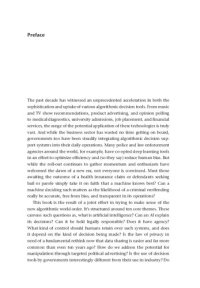
Ebook: A Citizen's Guide to Artificial Intelligence
A concise but informative overview of AI ethics and policy.
Artificial intelligence, or AI for short, has generated a staggering amount of hype in the past several years. Is it the game-changer it's been cracked up to be? If so, how is it changing the game? How is it likely to affect us as customers, tenants, aspiring homeowners, students, educators, patients, clients, prison inmates, members of ethnic and sexual minorities, and voters in liberal democracies? Authored by experts in fields ranging from computer science and law to philosophy and cognitive science, this book offers a concise overview of moral, political, legal and economic implications of AI. It covers the basics of AI's latest permutation, machine learning, and considers issues such as transparency, bias, liability, privacy, and regulation.
Both business and government have integrated algorithmic decision support systems into their daily operations, and the book explores the implications for our lives as citizens. For example, do we take it on faith that a machine knows best in approving a patient's health insurance claim or a defendant's request for bail? What is the potential for manipulation by targeted political ads? How can the processes behind these technically sophisticated tools ever be transparent? The book discusses such issues as statistical definitions of fairness, legal and moral responsibility, the role of humans in machine learning decision systems, “nudging” algorithms and anonymized data, the effect of automation on the workplace, and AI as both regulatory tool and target.
Artificial intelligence, or AI for short, has generated a staggering amount of hype in the past several years. Is it the game-changer it's been cracked up to be? If so, how is it changing the game? How is it likely to affect us as customers, tenants, aspiring homeowners, students, educators, patients, clients, prison inmates, members of ethnic and sexual minorities, and voters in liberal democracies? Authored by experts in fields ranging from computer science and law to philosophy and cognitive science, this book offers a concise overview of moral, political, legal and economic implications of AI. It covers the basics of AI's latest permutation, machine learning, and considers issues such as transparency, bias, liability, privacy, and regulation.
Both business and government have integrated algorithmic decision support systems into their daily operations, and the book explores the implications for our lives as citizens. For example, do we take it on faith that a machine knows best in approving a patient's health insurance claim or a defendant's request for bail? What is the potential for manipulation by targeted political ads? How can the processes behind these technically sophisticated tools ever be transparent? The book discusses such issues as statistical definitions of fairness, legal and moral responsibility, the role of humans in machine learning decision systems, “nudging” algorithms and anonymized data, the effect of automation on the workplace, and AI as both regulatory tool and target.
Download the book A Citizen's Guide to Artificial Intelligence for free or read online
Continue reading on any device:

Last viewed books
Related books
{related-news}
Comments (0)